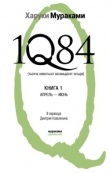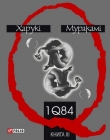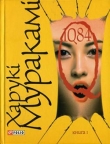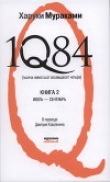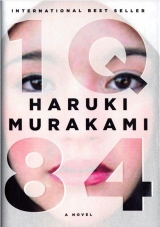
Текст книги "1q84"
Автор книги: Haruki Murakami
Жанр:
Современная проза
сообщить о нарушении
Текущая страница: 63 (всего у книги 81 страниц)
CHAPTER 13
Ushikawa
IS THIS WHAT THEY MEAN
BY BACK TO SQUARE ONE?
Ushikawa’s appearance made him stand out. He did not have the sort of looks suited for stakeouts or tailing people. As much as he might try to lose himself in a crowd, he was as inconspicuous as a centipede in a cup of yogurt.
His family wasn’t like that at all. Ushikawa’s family consisted of his parents, an older and younger brother, and a younger sister. His father ran a health clinic, where his mother was the bookkeeper. Both brothers were outstanding students, attended medical school, and became doctors. His older brother worked in a hospital in Tokyo, while his younger brother was a research doctor at a university. When his father retired, his older brother was due to take over the family clinic in Urawa, a suburb of Tokyo. Both brothers were married and had one child. Ushikawa’s sister had studied at a college in the United States and was now back in Japan, working as an interpreter. She was in her mid-thirties but still single. All his siblings were slim and tall, with pleasantly oval features.
In almost every respect, particularly in looks, Ushikawa was the exception in his family. He was short, with a large, misshapen head and unkempt, frizzy hair. His legs were stumpy and bent like cucumbers. His popping eyes always looked startled, and he had a thick layer of flesh around his neck. His eyebrows were bushy and large and nearly came together in the middle. They looked like two hairy caterpillars reaching out to each other. In school he had generally gotten excellent grades, but his performance in some subjects was erratic and he was particularly hopeless at sports.
In this affluent, self-satisfied, elite family, he was the foreign element, the sour, dissonant note that ruined the familial harmony. In family photos he looked like the odd man out, the insensitive outsider who had pushed his way into the group and had his picture taken with them.
The other members of his family couldn’t understand how someone who didn’t resemble them in the least could be one of them. But there was no mistaking the fact that his mother had given birth to him, with all the attendant labor pains (her recollection was how particularly painful that birth had been). No one had laid him at their doorstep in a basket. Eventually, someone recalled that there was a relative who also had an oversized, misshapen head—Ushikawa’s grandfather’s cousin. During the war he had worked in a metal shop in Koto Ward in Tokyo, but he died in the massive air raid in the spring of 1945. His father had never met the man, though he had a photo of him in an old album. When the family saw the photo, they exclaimed, “It all makes sense now!” Ushikawa and his uncle were such peas in a pod that you would think that Ushikawa was the man reincarnated. The genetic traits of this uncle had, for whatever reason, surfaced once more.
The Ushikawa family of Urawa, Saitama Prefecture, would have been the perfect family—in both looks and academic and career achievements—if only Ushikawa hadn’t existed. They would have been the kind of memorable, photogenic family that anyone would envy. But with Ushikawa in the mix, people tended to frown and shake their heads. People might begin to think that somewhere along the line a joker or two had tripped up the goddess of beauty. No, they definitely must think this, his parents decided, which is why they tried their hardest to keep him out of the public eye or at least make sure he didn’t stand out (though the attempt was always pointless).
Being put in this situation, however, never made Ushikawa feel dissatisfied, sad, or lonely. He wasn’t sociable to begin with and usually preferred to stay in the shadows. He wasn’t particularly fond of his brothers and sister. From Ushikawa’s perspective, they were irretrievably shallow. To him, their minds were dull, their vision narrow and devoid of imagination, and all they cared about was what other people thought. More than anything, they were completely lacking in the sort of healthy skepticism needed to attain any degree of wisdom.
Ushikawa’s father was a moderately successful doctor of internal medicine in the countryside, but he was so utterly boring that talking with him gave you chest pains. Like the king whose touch turned everything to gold, every single word he uttered turned into insipid grains of sand. But as a man of few words he was able—probably unintentionally—to conceal how boring and ignorant he really was. In contrast, his mother was a real talker, a hopeless snob. Money was everything to her, and she was self-centered and proud, loved anything gaudy and showy, and could always be counted on to bad-mouth other people in a shrill voice. Ushikawa’s older brother had inherited his father’s disposition; his younger brother had his mother’s. His sister was very independent. She was irresponsible and had no consideration for others. As the baby of the family, she had been totally pampered and spoiled by her parents.
All of which explained why, since he was a boy, Ushikawa had kept to himself. When he came home from school, he had shut himself in his room and gotten lost in books. He had no friends other than his dog, so he never had the chance to talk with someone about what he had learned, or debate anyone. Still, he was convinced that he was a clear, eloquent, logical thinker, and he patiently honed these abilities all by himself. For instance, he would propose an idea for discussion and debate it, taking both sides. He would passionately argue in support of the proposition, then argue—just as vigorously—against it. He could identify equally with either of the two positions and was completely and sincerely absorbed by whatever position he happened to be supporting at the moment. Before he had realized it, these exercises had given him the talent to be skeptical about his own self, and he had come to the recognition that most of what is generally considered the truth is entirely relative. Subject and object are not as distinct as most people think. If the boundary separating the two isn’t clear-cut to begin with, it is not such a difficult task to intentionally shift back and forth from one to the other.
In order to use logic and rhetoric more clearly and effectively, he filled his mind with whatever knowledge he could find—both what he thought would be useful and what he was pretty sure was the opposite. He chose things he agreed with, and things that, initially, he opposed. It wasn’t cultivation and learning in the usual sense that he was after, but more tangible information—something you could actually handle, something with a real shape and heft.
That huge, misshapen head of his turned out to be the perfect container for these quantities of accumulated information. Thanks to all this, he was far more erudite than any of his contemporaries. If he felt like it, he knew he could shoot down anybody in an argument—not just his siblings or classmates, but his teachers and parents as well. But he didn’t want to attract any kind of attention if he could avoid it, so he kept this ability hidden. Knowledge and ability were tools, not things to show off.
Ushikawa began to think of himself as a nocturnal creature, concealed in a dark forest, waiting for prey to wander by. He waited patiently for an opportunity, and when it came he would leap out and grab it. But until that point, he couldn’t let his opponent know he was there. It was critical to keep a low profile and catch the other person off guard. Even as an elementary school pupil, he had thought this way. He never depended on others or readily revealed his emotions.
Sometimes he imagined how his life would be if he had been born a little better-looking. He didn’t need to be handsome. There was no need to look that impressive. He just needed to be normal-looking, or enough so that people wouldn’t turn and stare. If only I had been born like that, he wondered, what sort of life would I have led? But this was a supposition that exceeded his powers of imagination. Ushikawa was too Ushikawa-like, and there was no room in his brain for such hypotheses. It was precisely because of his large, misshapen head, his bulging eyes, and his short, bandy legs that he was who he was, a skeptical young boy, full of intellectual curiosity, quiet but eloquent.
As the years passed the ugly boy grew up into an ugly youth, and before he knew it, into an ugly middle-aged man. At every stage of his life, people continued to turn and stare. Children would stare unabashedly at him. When I become an ugly old man, Ushikawa sometimes thought, then maybe I won’t attract so much attention. But he wouldn’t know for sure. Maybe he would end up the ugliest old man the world had ever seen.
At any rate, he was not equipped with the skills needed to blend into the background. And to make matters worse, Tengo knew what he looked like. If he was discovered hanging around outside Tengo’s building, the whole operation would come crashing down.
In situations like this, Ushikawa normally hired someone from a PI agency. Ever since he was a lawyer, he had made use of these sorts of organizations, which mostly employed former policemen who were adept at digging up information, shadowing people, and conducting surveillance. But in this case, he didn’t want to involve any outsiders. Things were too touchy, and a serious crime—murder—was involved. Besides, Ushikawa wasn’t even sure what he might gain by putting Tengo under surveillance.
What Ushikawa wanted was to make clear the connection between Tengo and Aomame, but he wasn’t even sure what Aomame looked like. He had tried all sorts of methods but had yet to come up with a decent photo. Even Bat hadn’t been able to obtain one. Ushikawa had looked at her high school graduation album, but in the class photo her face was tiny and somehow unnatural-looking, like a mask. In the photo of her company softball team she had on a wide-brimmed cap and her face was in shadow. So even if Aomame were to pass him on the street, he would have no way of knowing if it was really her. He knew she was nearly five feet six inches tall and had a trim body and good posture. Her eyes and cheekbones were distinctive, and she wore her hair down to her shoulders. But there were plenty of women in the world who fit that description.
So it looked like Ushikawa would have to undertake the surveillance by himself. He would have to keep his eyes open, patiently waiting for something to happen, and, when it did, instantly react. He couldn’t ask someone else to handle such a delicate undertaking.
Tengo was living on the third floor of an old, three-story concrete apartment building. At the entrance was a row of mailboxes for all the residents, one of them with a name tag on it that said Kawana. Some of the mailboxes were rusty, the paint peeling off. They all had locks, but most of the residents left them unlatched. The front door of the building was unlocked, and anyone could go inside.
The dark corridor inside had that special odor you find in older apartment buildings. It is a peculiar mix of smells—of unrepaired leaks, old sheets washed in cheap detergent, stale tempura oil, a dried-up poinsettia, cat urine from the weed-filled front yard. Live there long enough and you would probably get used to the smell. But no matter how used to it you got, the fact remained that this was not a heartwarming odor.
Tengo’s apartment faced the main road. It wasn’t all that noisy, but there was a fair amount of foot traffic. An elementary school was nearby and at certain times of day there were large groups of children outside. Across from the building was a clump of small single-family homes, two-story houses with no garden. Just down the road were a liquor store and a stationery store catering to elementary school children. And two blocks farther down was a small police substation. There was nowhere to hide, and if he were to stand by the road and look up at Tengo’s apartment—even if Tengo didn’t discover him—the neighbors would be sure to cast a suspicious eye his way. And since he was such an unusual-looking character, the locals’ alert level would be ratcheted up a couple of levels. He might be mistaken for a pervert waiting for the kids to get out of school, and neighbors might call the police.
In surveillance the first requirement is finding a suitable place from which to watch, a place to track your target’s movements and maintain a steady supply of water and food. The ideal situation would be to have a room from which Ushikawa could see Tengo’s apartment. He could set up a camera with a telephoto lens on a tripod and keep watch over movement in the apartment and who came in and out. Since he was alone on the assignment, twenty-four-hour coverage was impossible, but Ushikawa figured he could cover it for ten hours a day. Needless to say, however, finding a suitable place was going to be tricky.
Even so, Ushikawa walked the neighborhood, searching. He wasn’t the type to give up easily. Tenaciousness was, after all, his forte. But after pounding the pavement of every nook and cranny of the neighborhood, Ushikawa called it quits. Koenji was a densely populated residential area, flat with no tall buildings. The number of places from which Tengo’s apartment was visible was very limited, and there was not a single one he thought he could use.
Whenever Ushikawa had trouble coming up with a good idea, he liked to take a long, lukewarm soak in the tub, so he went back home and drew a bath. As he lay in the acrylic bathtub, he listened to Sibelius’s violin concerto on the radio. He didn’t particularly want to listen to Sibelius—and Sibelius’s concerto wasn’t exactly the right music to listen to at the end of a long day as you soaked in the tub. Perhaps, he mused, Finnish people liked to listen to Sibelius while in a sauna during their long nights. But in a tiny, one-unit bathroom of a two-bedroom condo in Kohinata, Bunkyo Ward, Sibelius’s music was too emotional, too tense. Not that this bothered him—as long as there was some background music, he was fine. A concerto by Rameau would do just as well, nor would he have complained if it had been Schumann’s Carnaval. The radio station just happened to be broadcasting Sibelius’s violin concerto. That was all there was to it.
As usual, Ushikawa let half his mind go blank and thought with the other half. David Oistrakh’s performance of Sibelius went through the blank half of his mind, like a gentle breeze wafting in through a wide-open entrance and out through a wide-open exit. Maybe it was not the most laudable way of appreciating music. If Sibelius knew his music was being treated this way, it was easy to imagine how those large eyebrows would frown, the folds of his thick neck coming together. But Sibelius had died long ago, and even Oistrakh had long since gone to his grave. So Ushikawa could do as he pleased and let the music filter from right to left, as the unblank half of his brain toyed with random thoughts.
In times like these, Ushikawa didn’t like to have a set objective. He let his thoughts run free, as if he were releasing dogs on a broad plain. He would tell them to go wherever they wanted and do whatever they liked, and then he would just let them go. He sank down in the bathwater up to his neck, closed his eyes, and, half listening to the music, let his mind wander. The dogs frolicked around, rolled down slopes, gamboled after each other tirelessly, chased pointlessly after squirrels, then came back, covered in mud and grass, and Ushikawa patted their heads and fastened their collars back on. The music came to an end. Sibelius’s violin concerto was a roughly thirty-minute piece—just the right length. The next piece, the announcer intoned, is Janáček’s Sinfonietta. Ushikawa had a vague memory of hearing the name of the piece before, but he couldn’t remember exactly. When he tried to recall, his vision turned strangely cloudy and indistinct, as if a cream-colored mist had settled over his eyeballs. He must have stayed too long in the bath, he decided. He gave up, switched off the radio, got out of the bathtub, wrapped a towel around his waist, and got a beer from the fridge.
Ushikawa lived by himself. He used to have a wife and two small daughters. They had bought a house in the Chuorinkan District in Yamato, in Kanagawa Prefecture. It was a small house, but they had a garden and a dog. His wife was good-looking enough, and his daughters were even pretty. Neither daughter had inherited anything of Ushikawa’s looks, which was a great relief.
Then, like a sudden blackout on the stage between acts, he was alone. He found it hard to believe that there had ever been a time when he had a family and lived with them in a house in the suburbs. Sometimes he was even sure the whole thing must be a misunderstanding, that he had unconsciously fabricated this past for himself. But it had actually happened. He had actually had a wife he shared a bed with and two children who shared his bloodline. In his desk drawer, he had a family photo of the four of them. They were all smiling happily. Even the dog seemed to be grinning.
There was no likelihood that they would ever be a family again. His wife and daughters lived in Nagoya now. The girls had a new father, the kind of father with normal looks who wouldn’t embarrass them when he showed up at parent-teacher conference day. The girls hadn’t seen Ushikawa for nearly four years, but they didn’t seem to regret this. They never even wrote to him. It didn’t bother Ushikawa much either that he couldn’t see his daughters. This didn’t mean that his daughters weren’t important to him. It was just that now his top priority was simply keeping himself secure, so for the time being he had to switch off any unnecessary emotional circuits and focus on the tasks at hand.
Plus, he knew this: that no matter how far away his daughters went from him, his blood still flowed inside them. His daughters might forget all about him, but that blood would not lose its way. Blood had a frighteningly long memory. And the sign of that large head would, sometime, somewhere in the future, reappear, in an unexpected time and unexpected place. When it did, people would sigh and remember that Ushikawa had once existed.
Ushikawa might be alive to witness this eruption, or perhaps not. It didn’t really matter. He was satisfied just to know that it was possible. It wasn’t like he was hoping for revenge. Rather, he felt content to know that he was, unavoidably, an inherent part of the world’s structure.
He sat down on his sofa, plopped his stubby legs up on the table, and, as he sipped his beer, a thought suddenly came to him. It might not work out, he thought, but it was worth trying. It’s so simple—why hadn’t it occurred to me? he wondered, finding it odd. Maybe the easiest things are the hardest to come up with. Like they say, people miss what’s going on right under their noses.
The next morning Ushikawa went to Koenji again. He saw a real estate agency, went inside, and asked if there were any apartments available for rent in Tengo’s building. But this agency didn’t handle that building. All rentals in that apartment building were handled by an agency in front of the station.
“I sort of doubt there are any units available,” the agent said. “The rent is reasonable, and it’s a convenient location, so few people move out.”
“Well, I’ll ask anyway, just to make sure,” Ushikawa said.
He stopped by the agency in front of the station. A young man in his early twenties was the one who dealt with him. The man had jet-black hair, hardened with gel to the consistency of a bird’s nest. He wore a bright white shirt and a brand-new tie. He probably hadn’t been working there long. He still had marks from pimples on his cheeks. The man flinched a bit when he looked at Ushikawa, but soon recovered and gave him a pleasant, professional smile.
“You’re in luck, sir,” the young man said. “The couple on the first floor had some family issues that arose and they had to move out quickly, so one of the units has been vacant for a week. We finished cleaning it yesterday but haven’t advertised it yet. It’s on the first floor so it might be a bit noisy, and it doesn’t get a lot of sun, but it’s a wonderful location. There is one condition of the contract, however: in five or six years the owner plans to completely rebuild the place, so when you receive notice of that renovation six months ahead of time, you’ll need to move out, with no complaints. Plus, there’s no parking lot there.”
“Not a problem,” Ushikawa replied. He didn’t plan to stay there that long, and he didn’t have a car.
“Excellent. If you agree to those conditions, then you can move in at once. I imagine you would like to see the apartment first?”
“Yes, of course,” Ushikawa replied. The young man took a key out of a desk drawer and passed it to him.
“I’m very sorry, but I have an errand to run, so if you don’t mind, could you check out the place by yourself? The apartment is empty, and all you need to do is drop off the key on your way back.”
“That sounds fine,” Ushikawa said, “but what if I’m some evil man who never gives the key back, or makes a copy and sneaks in later to ransack the place? What would you do then?”
The young man stared in surprise at Ushikawa for a time. “Yes, good point. I see. Just to be on the safe side, could you give me a card?”
Ushikawa took out one of his New Japan Foundation for the Advancement of Scholarship and the Arts business cards and handed it to him.
“Mr. Ushikawa,” the young man frowned as he read the name. But then he looked relieved. “You don’t look to me like someone who would do something bad.”
“Much appreciated,” Ushikawa replied. And he smiled, a smile as meaningless as the title listed on his card.
No one had ever told him this before. Maybe it meant his looks were too unusual for him to ever do anything bad. It would be too easy for anyone to describe him, and a simple matter to draw a police sketch. If a warrant were issued for his arrest, he wouldn’t last three days.
The apartment was nicer than he had imagined. Tengo’s third-floor apartment was two stories directly above, so it was impossible to observe his place. But the front entrance was visible from his window so he could see when Tengo entered and exited the building, and spot anyone visiting him. He could just camouflage a telephoto lens and take pictures of each person’s face.
In order to rent this apartment he had to pay two months’ security deposit: one month’s rent up front, plus a fee equivalent to the second month’s rent. The rent itself wasn’t that high, and the security deposit would be returned when the lease was up, but still, this all came to a hefty sum. Having just paid Bat, his resources were severely depleted, but he knew he had to rent that apartment. There was no other choice. Ushikawa went back to the real estate agency, took out the cash he had already prepared in an envelope, and signed the lease. The lease was with the New Japan Foundation for the Advancement of Scholarship and the Arts. He told them he would mail them a certified copy of the foundation’s registry later. This didn’t seem to faze the young real estate agent. Once the lease was signed, the agent again handed him the keys.
“Mr. Ushikawa, the apartment is ready for you to move in today. The electricity and water are on, but you will have to be present when they turn on the gas, so please contact Tokyo Gas yourself. What will you do about a phone?”
“I’ll handle that myself,” Ushikawa said. It took a lot of time and effort to get a contract with the phone company, and a workman would have to come to the apartment to install it. It was easier to use a nearby pay phone.
Ushikawa went back to the apartment and drew up a list of items he would be needing. Thankfully the previous resident had left the curtains up. They were old, flowery curtains, but as long as they were curtains, he felt lucky to have them. Curtains of some kind were indispensable to a stakeout.
The list of necessary items wasn’t all that long. The main things he would need were food and drinking water, a camera with a telephoto lens, and a tripod. The rest of his list included toilet paper, a heavy-duty sleeping bag, portable kerosene containers, a camping stove, a sharp knife, a can opener, garbage bags, basic toiletries, and an electric razor, several towels, a flashlight, and a transistor radio. The minimal amount of clothes and a carton of cigarettes. That was about it. No need for a fridge, a table, or bedding. As long as he had a place to keep out of the weather, he considered himself lucky. Ushikawa returned to his own house and put a single reflex and a telephoto lens in a camera bag, as well as an ample amount of film. He then stuffed all the items on his list into a travel bag. He bought the additional things he still needed in the shopping district in front of Koenji Station.
He set up his tripod next to the window, attached the latest Minolta automatic camera to it, screwed on the telephoto lens, aimed it at the level of the faces of anyone who came in or exited the building, and set the camera to manual. He made it so he could use a remote control to work the shutter and set the motor drive. He fashioned a cardboard cone to go around the lens so that light wouldn’t reflect off the lens. From the outside, part of a paper tube was visible at one end of the slightly raised curtain, but no one would ever notice it. No one would ever imagine that someone was secretly photographing the entrance of such a nondescript apartment building.
Ushikawa took a few test shots of people coming in and out of the building. Because of the motor drive he was able to get three quick shots of each person. As a precaution he wrapped a towel around the body of the camera to muffle any noise. As soon as he finished the first roll, he took it to the photo store next to the station. The clerk placed it in a machine that would automatically develop and print the photos. It handled great numbers of photos at high speed, so no one ever noticed or cared about the images printed on them.
The photos came out fine—not very artistic, to be sure, but serviceable. The faces of the people entering and exiting the building were clear enough to distinguish one from another. On the way back from the photo shop, Ushikawa bought some mineral water and several cans of food. And he bought a carton of Seven Stars at a smoke shop. Holding his bags of purchases in front of him to hide his face, he returned to the apartment and sat down again in front of the camera. As he kept watch over the entrance he drank some water, ate canned peaches, and smoked a couple of cigarettes. The electricity was on, but for some reason not the water. When he turned on the tap there was a rumbling sound in the wall, but nothing came out. Something had to be holding them up from turning on the water. He thought of contacting the real estate agent, but, wanting to limit his trips in and out of the building, he decided to wait and see. No running water meant he couldn’t use the toilet, so instead he peed into an old bucket the cleaning company had conveniently forgotten to take away.
The impatient early-winter twilight came quickly and the room grew totally dark, but still he didn’t turn on the lights. Ushikawa rather welcomed the darkness. The light came on at the entrance and he continued to survey the faces that passed by under the yellowish light.
As evening came, the foot traffic into and out of the building increased a bit, though the number of people was still not that great. It was, after all, a small apartment building. Tengo was not among them, and neither was anyone who could possibly be Aomame. Tengo was scheduled to teach at the cram school today. He would be coming back in the evening. He didn’t usually stop off anywhere on the way home after work. He preferred to make his own dinner rather than eat out, and he liked to eat alone while reading. Ushikawa knew all this. But Tengo didn’t come home. Perhaps he was meeting someone after work.
A variety of people lived in the building, everyone from young, single working people, to college students, to couples with small children, to elderly people living alone—people from all walks of life. But all of them entered the frame of the lens, unaware they were under surveillance. Despite some differences in age and circumstances, every one of them looked worn out, tired of life. They appeared hopeless, abandoned by ambition, their emotions worn away, with only resignation and numbness filling the void left behind. As if they had just had a tooth pulled, their faces were dark, their steps heavy.
But he may have been mistaken. Some of them may have actually been enjoying life to the fullest. Once they opened their doors, there was some breathtaking little paradise waiting just for them. Perhaps some of them were pretending to live a Spartan life to avoid getting audited by the Tax Bureau. This was possible. But through the telephoto lens, they all looked like dead-end city dwellers not going anywhere in life, clinging to a cheap apartment scheduled to be torn down.
That night Tengo didn’t make an appearance and Ushikawa saw no one who could be connected to him. When ten thirty rolled around, he decided to call it a day. He hadn’t quite settled into a routine and didn’t want to push it. There will be many days to come, he decided, so this is enough for now. He did a variety of stretches to loosen his stiff muscles, then ate a sweet anpan bun, poured coffee from his thermos into the cap, and drank it. He tried the faucet in the sink, and now the water was running. He washed his face with soap, brushed his teeth, and took a good, long pee. He leaned back against the wall and smoked a cigarette. He longed for a sip of whiskey, but he had decided that as long as he was here, he wouldn’t touch a drop of alcohol.


